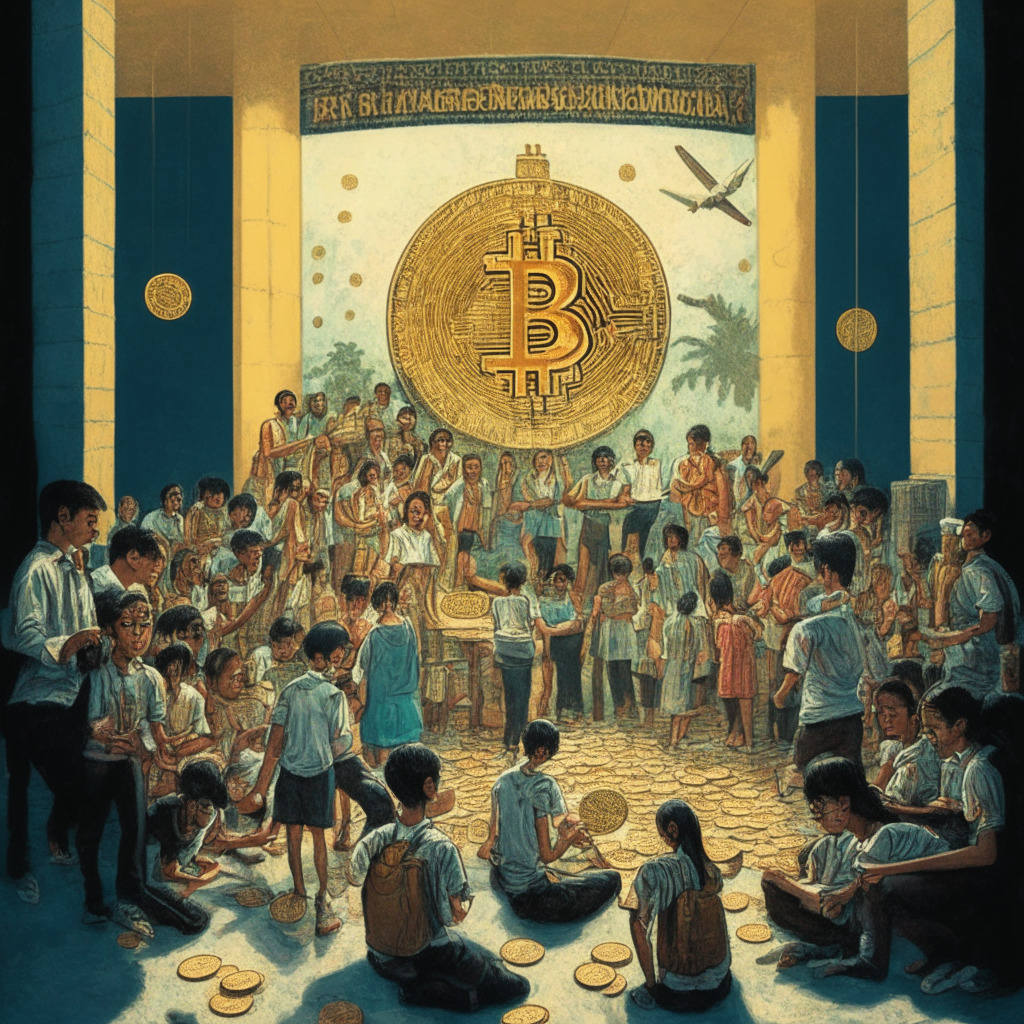World Mobile, a decentralized mobile internet provider, has expanded its services via Google Play, allowing users in select countries to leverage blockchain for cost-effective internet access. This blockchain-based project promotes telecom sharing economy and integrates AI solutions for enhanced customer service, thereby democratizing technology and wealth access.
Search Results for: World Mobile
The Evolutionary Leap: Polygon 2.0 and the Ripple Labs Expansion, Amidst Legalities and Ethical Quandaries in Crypto World
Polygon Labs announces its journey towards Polygon 2.0, aiming to boost the Ethereum blockspace and promise limitless scalability. While Ripple Labs extends its Liquidity Hub, offering improved customer experience, questions arise around potential legislative challenges. Developments in crypto legalities and ethical dilemmas in blockchain transactions continue to make the space more dynamic.
Opera Mini Harnesses the Power of Blockchain with MiniPay: Reshaping Africa’s Mobile Payment Landscape
Opera Mini has announced a partnership with Celo Blockchain to launch a non-custodial wallet, named MiniPay, integrated into its mobile browser. With the ability to perform transactions using only a phone number and support for local payment methods, MiniPay is designed to transform mobile payments particularly in Africa.
Canadian Police’s Blockchain Move: Balancing Freedom and Security in the Crypto World
The Royal Canadian Mounted Police (RCMP) plans to develop a digital asset solution to streamline storage and safeguarding of cryptocurrencies and NFTs, facilitating the top 20 cryptocurrencies by market capitalization. This move reignites the conversation about the balance between control and freedom in major aspects of blockchain technology.
Unveiling Apple’s New Gen AI: Bridging Innovation, Security and Ethics in the Tech World
“Apple is developing an in-house AI tool, aiming to enhance user experiences through AI integration in their forthcoming iOS17. However, this raises concerns over data security, prompting debate on whether AI should operate locally or on cloud. This has fueled greater focus on AI for mobile devices.”
Reinvigorating Meta’s Metaverse: A Strategy Swing Towards Mobile Gaming and AI Innovation
Meta’s new strategy for its Horizon Worlds platform involves nurturing an in-house VR game studio, Ouro Interactive, to create pioneering first-party titles. Aiming for broader appeal, Meta plans to introduce Horizon Worlds to mobile gamers globally, transforming the platform from VR-exclusive to VR-predominant. This move targets users without VR headsets and enables cross-platform play. Despite recent financial losses, the company remains optimistic about AI and metaverse as focal priorities.
Unleashing the Potential of IoT: Seven Real-world Applications and the Security Paradox
“The Internet of Things (IoT) integrates physical devices with the digital world, revolutionizing industries by enhancing efficiencies and creating opportunities. Applications include smart home automation systems, predictive maintenance in manufacturing, healthcare tracking devices, smart farming, connected cars, smart cities, and personalized retail experiences. Critics caution about unaddressed ethical and security issues.”
Unmasking Worldcoin: The Juxtaposition of Privacy, Centralization, and Digital Identity
“The launch of Worldcoin, a blockchain platform promising identity privacy through an iris scan, is sparking debate around privacy, centralization, and global identity. Critics argue the project’s centralization and handling of sensitive data presents substantial risk. As blockchain evolves, grappling with these issues will intensify.”
Crypto Rewards in Mobile Gaming: Exciting Future or Mere Pocket Change?
Bitcoin payments startup Zebedee has launched ZBD, a feature in its Android app that rewards players with small amounts of Bitcoin for playing over 100 eligible mobile games, due to a partnership with advertising platform Adjoe. The integration of cryptocurrency rewards showcases the potential for blockchain technology and cryptocurrency markets to become prominent in the gaming industry, while also raising questions about the long-term financial viability for players.
Revival of Gods Unchained: Epic Games Store Launch, Mobile Expansion, and Immutable’s Future Plans
NFT game Gods Unchained is set for a revival in 2023 with its launch on the popular Epic Games Store, attracting a larger audience. Developer Immutable Games Studio plans to introduce new game modes, a major expansion pack, and expand to iOS and Android platforms to enhance user experience and accessibility.
Revolutionizing Crypto Custody: How Mobile-Based Self-Custody Wallets Challenge Traditional Solutions
FinTech firm Censo recently launched a mobile phone-based self-custody wallet for institutions and organizations, offering a decentralized key management solution that is more user-friendly and cost-effective than existing technologies. Leveraging secure hardware enclaves in modern mobile devices, Censo’s open-source wallet presents a compelling alternative to MPC-based custody solutions.
AI vs. Human Governance: Debating Regulatory Efforts and Crypto Restrictions Worldwide
AI experts sign an open statement highlighting the need for mitigating extinction risks from AI, as global regulatory efforts increase. Binance restricts privacy tokens trading in four European countries, while the MiCA cryptocurrency regulatory framework is signed into law.
Earning Bitcoin with Solitaire Games: A Comparison of Three Mobile Apps and Their Rewards
The play-to-earn gaming craze enables players to earn Bitcoin without NFT investment. Solitaire, available on iOS and Android, has three competing versions: Club Bitcoin, Bitcoin Solitaire, and Solitaire – Card Game 2023. Although rewards amount to pennies, Bling’s Bitcoin Solitaire offers the best balance between gameplay experience and comparatively higher rewards.
ChatGPT App Launch: A New Era in Mobile AI and Its Implications on Blockchain
OpenAI launches an official ChatGPT app for iOS, offering seamless user experience and enhanced accessibility to the popular chatbot. Android users can expect a launch soon. Privacy remains a priority, while comparisons between ChatGPT, Google’s Bard and Microsoft’s Bing highlight the varying capabilities of AI chatbots.
Metaverse Debate: Tech World Divided Between Potential and Abandonment
This article debates the metaverse’s future, as some claim it has run its course and been abandoned by businesses, while others like Tim Sweeney argue that there are still 600 million monthly active users across platforms, and tech giants continue investing in its potential.
Navigating the Crypto Maze: Cointelegraph’s Research Terminal -Boon or Bane?
“Cointelegraph’s Research Terminal is a new tool offering quality content about the blockchain and cryptocurrency sphere. Covering a broad range of the crypto ecosystem, this platform aims to keep users informed about industry developments. However, the risk of information overload and misinformation, alongside its exclusivity, could discourage some enthusiasts. The terminal represents a tool potentially empowering for investors but balancing data comprehensiveness and clarity is critical.”
South Korea Crypto Fraud: A Tipping Point Between Alluring Returns and Swindling Risks
In South Korea, a crypto fraudster, pseudonym ‘A’, has been sentenced to seven years imprisonment. ‘A’ conned $2.2 million from over 30 investors by promising them quick and hefty returns on crypto deposits. The case highlights growing crypto scams in South Korea, which notably occur in mobile chat applications’ ‘crypto investment study groups’.
Blockchain Boundaries: Telecom Titan NTT Docomo Joins Forces with Crypto Exchange Monex
“In a recent breakthrough, NTT Docomo and crypto exchange Monex announced a strategic partnership to develop new asset formation services, aiming to expand individual wealth formation in Japan. The alliance shows Monex’s increasing footprint in the crypto world, indicating potential domestic and international expansion.”
Navigating the Tightrope: Looking at Sam Bankman-Fried’s Fraud Case and a Crucial Paradox in Blockchain
“Amid accusations of fraud against former FTX CEO, Sam Bankman-Fried, one can see the challenge of balancing entrepreneurial audacity and legality in the expanding crypto space. As blockchain technologies venture into numerous sectors, the resolution of potential legal disputes can determine industry credibility.”
How the Digital Yuan is Revolutionizing Gold Recycling and Real Estate Transactions in China
“China’s financial entities, local governmental bodies and businesses are gradually embracing the digital yuan, China’s Central Bank Digital Currency (CBDC), revolutionizing sectors from gold recycling to land registry fee payment. The gold recycling project powered by digital yuan and CBDC-powered land registry adoption in Fuqing highlights the acceleration of the digital yuan in various scenarios.”
Binance’s Euro Crisis: The Impact of Regulatory Scrutiny on Crypto Exchanges Future
Binance, the largest crypto exchange, is facing regulatory challenges in Europe, especially in France, after its partnership with digital payment services provider, Paysafe, expired. With no banking partner, Binance France advised users to convert any fiat money they hold into crypto while the company seeks a new partnership. This situation highlights the need for crypto exchanges to comply with financial regulations to avoid service disruptions and maintain user trust.
China’s Digital Yuan Invites Tourists – Steps Towards Global Crypto Acceptance or Potentiable Pitfall?
“China expands the utility of its Digital Yuan App to include tourist-friendly features. The latest update allows visitors to pre-charge their wallets using VISA and Mastercard, driving China’s intentions to establish e-CNY as a commonplace retail option, marking a significant step in the evolution of global digital currencies.”
UnionBank Steps Into Crypto Arena: Landmark Move Towards Future-Ready Banking in Philippines
The Philippines’ Union Bank has become the first licensed bank in the country to serve as a virtual asset service provider, validated by the Bangko Sentral ng Pilipinas. Alongside, it’s introducing a feature for trading cryptocurrencies directly through its mobile app, marking a significant stride in digital banking transformation.
PayPal’s Venmo and the Stalled Adoption of PYUSD Stablecoin: Analysis and Future Implications
“PayPal’s mobile payment platform, Venmo, has begun offering its Ethereum-based stablecoin, PYUSD, marking a significant step toward integrating cryptocurrency with mainstream finance. Despite its robust structure and support, PYUSD’s adoption has been slow, likely due to competition and regulatory contradictions.”
Crypto Galore: El Salvador’s Bitcoin Education to Binance’s Legal Tussle – the Week in Review
“The week in the crypto world was replete with notable developments from El Salvador’s Bitcoin literacy initiative to security issues identified with Telegram Bots by Certik. Meanwhile, high-profile legal battles and regulatory changes kept the industry on its toes. Despite challenges, tech giants like Sony and PayPal advanced their blockchain and crypto endeavors, emphasizing the market’s enduring dynamism.”
Deciphering the Paradox: The Ambitious Race to Democratize the Metaverse
Meta’s latest product, Horizon Worlds, aims to bring metaverses to mobile and web platforms. Amid limited accessibility and undisclosed user statistics, the promise of a democratized metaverse that caters to every individual remains uncertain. However, blockchain-based platforms like Decentraland and The Sandbox have chosen to start with PC and web-based experiences, offering a contrast to Meta’s approach.
Breaking Barriers: The Call for Greater Inclusivity and Regulatory Balance in the Crypto Space
MobileCoin CEO, Sara Drakeley, emphasizes the need for broader inclusivity, especially for women, in the crypto industry. She maintains that subtle changes could increase women’s participation in crypto, highlighting opportunities for balancing privacy, transparency, and inclusivity. Drakeley also discusses the growth of MobileCoin and anticipates significant shifts in crypto regulations.
A Peek at a Full-Throttle Week in Cryptosphere: Developments, Scenarios and Legal Proceedings
“The crypto-sphere saw liquid staking surge to near-record highs and Vitalik Buterin predicting Ethereum full nodes could start running on mobile devices. Blockchain evolution is influencing EU policy, with AR capabilities and blockchain MMORPGs creating a buzz. Meanwhile, illegal activities emphasize the need for regulatory oversight.”
Navigating Taiwan’s Unfolding Crypto Regulation: Certainty or Stifling Innovation?
“Taiwan is crafting restrictions for offshore cryptocurrency exchanges operating within its domains. The Financial Supervisory Commission (FSC) is formulating a guidebook to help virtual asset services providers establish regulatory norms, focusing on information disclosure, virtual asset listing standards, and secure division of corporate and customer assets.”
Navigating the Next Billion Users: Attracting Professional Traders to Crypto and Its Consequences
Professional traders are viewed as potential crypto users, influenced by high-frequency trading and dependent on cryptocurrency exchanges. These traders prioritize a platform’s functionality, device access, and a breadth of tradeable assets. However, their influx could inflate the crypto market, increasing the risk of a burst bubble and upping demands for regulatory scrutiny.
Dipping Traffic for AI Chatbot: A Seasonal Fluctuation or a Larger Concern for the Academic Sector?
While user traffic to AI chatbot, ChatGPT, decreased globally for the third consecutive month in August, there are signs of growth in US visitation. Traffic fluctuations may be due to seasonal variations, such as university summer breaks, with drop in use particularly noticeable in younger demographics. However, inconsistencies in unique visitor data present further questions about actual user demographics and motivations. Despite declining visits, AI chatbots remain valuable in academics among other sectors.
East Asia’s Blockchain Paradox: Remarkable Tech Advancements Amid Regulatory Challenges & Scams
“Tencent’s new large language model, Hunyuan, features over 2 trillion training parameters, promising more efficient data processing. However, questions about data-handling accuracy persist. Meanwhile, South Korea witnesses an $83 million crypto scam, underscoring the need for greater transparency and accountability in the cryptosphere.”































